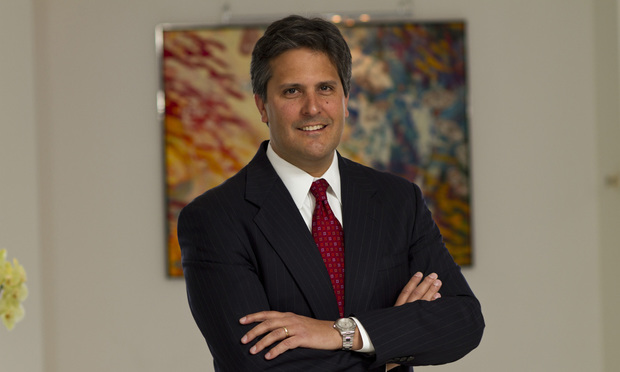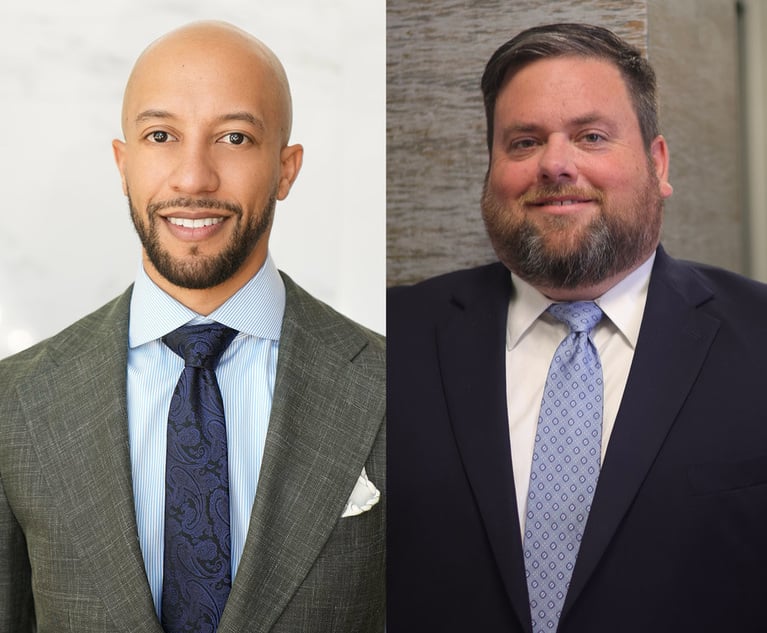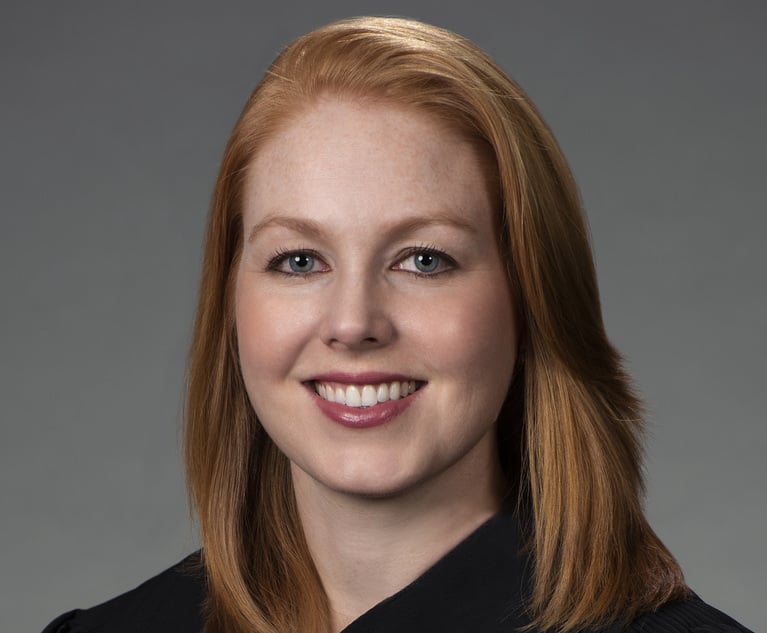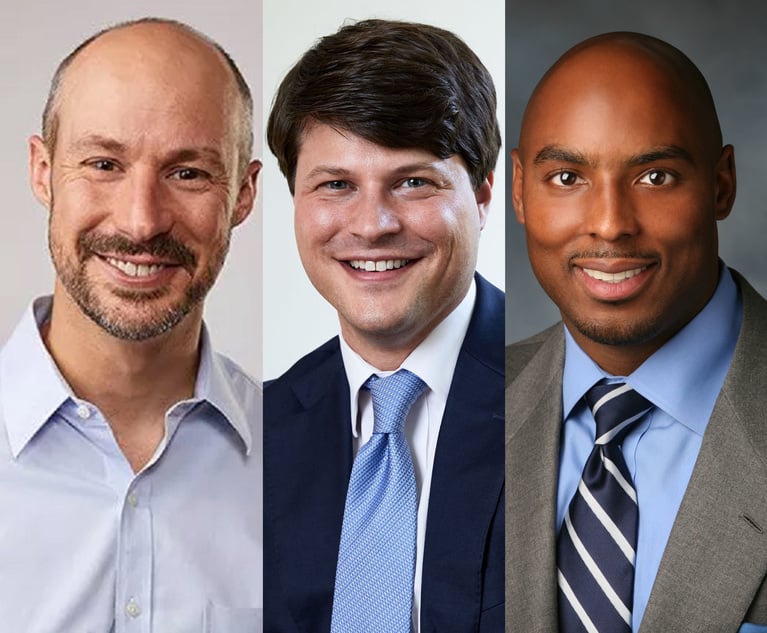Alston Partners Explore 'Frontier' of Anti-Corruption Enforcement in Construction Industry
With big-money projects involving chains of subcontractors, the construction industry has become a target-rich environment for the Justice Department.
March 15, 2019 at 12:00 PM
6 minute read
The original version of this story was published on Daily Business Review
 Paul Monnin, Alston & Bird, Atlanta. Photo: John Disney/ALM.
Paul Monnin, Alston & Bird, Atlanta. Photo: John Disney/ALM.
The U.S. Department of Justice has its eye on the construction industry, which should be preparing for a surge in investigations and enforcement actions under the Foreign Corrupt Practices Act and False Claims Act.
Former federal prosecutors, criminal defense attorneys and construction and government contracts lawyers say the DOJ's recent actions, including a multimillion-dollar bribery case against former executives of New Jersey-based Cognizant Technology Solutions Corp., signal the agency is aggressively expanding its FCPA and whistleblower enforcement beyond the more traditional health care and pharma sectors.
The target-rich environment of the construction industry has become “the frontier right now on corruption and bribery and fraud enforcement,” said Atlanta-based Alston & Bird partner Paul Monnin, a former assistant U.S. attorney in Georgia who served as deputy chief of the economic crimes section.
Large construction and infrastructure projects typically involve deep pools of cash that flow along chains of subcontractors in which each link is an opportunity for wrongdoing. Place the project in a foreign jurisdiction where government officials might expect bribes for building permits and it's a recipe for serious risk.
“We've seen an uptick in major infrastructure projects, and those are generally in the developing world, which has the highest corruption risks. There's risk around every corner in one of these projects,” said Dan Shallman, a partner at Covington & Burling in Los Angeles. He's a former federal public corruption prosecutor who now defends companies against FCPA and qui tam actions.
U.S.-based construction companies doing business in a foreign country also face substantial risks when entering into joint ventures with local companies that are “unsophisticated and used to doing business using bribes,” according to Chris Roux, who co-leads Alston & Bird's construction and government contracts team.
“A substantial amount of due diligence needs to be done by the U.S. company to understand who it is working with, and to ensure there are financial controls established in order to ensure that monies cannot be used inappropriately,” he wrote in an email.
On the FCA side of the enforcement coin, lawyers for whistleblowers are becoming increasingly interested in design and engineering cases involving express certification liability, notably owners of public construction companies certifying billing records as being accurate, according to Monnin.
“That is like an arrow that is just fired right at the heart of the company. You're certifying that it's accurate based on the contract and what you were supposed to be able to bill,” Monnin said. “You have instances in which a bidder will come in and lock itself into a particular budget or fee and then they start robbing Peter to pay Paul. From the DOJ side, it's kind of like shooting fish in a barrel.”
Asked if the government was targeting specific areas within the construction industry, DOJ spokeswoman Nicole Navas Oxman wrote in an email that the agency “follows the evidence—we don't target specific areas.” She also stated that statistics on anti-corruption enforcement efforts related to foreign construction projects were unavailable.
'Brave New World'
In the Bond Building in Washington, home of the DOJ's criminal fraud section, Monnin said he's observed “a ton of new faces, a ton of younger people who come out of big sophisticated shops in New York and D.C. where they're not afraid of big document cases and they've been on the defense side of these FCPA cases.”
These new faces are apparently an integral part of the enforcement wave approaching the construction industry, which primarily wants to know about the extent of its standard of care in overseeing the activities of subcontractors.
“That's the conversation with the FCPA,” Monnin said. “'What's the standard of care here? How much do we have to audit or review the invoicing that we're getting from our subs to ensure that cash pools aren't being created to allow those subs to pay bribes?' And the response from the government tends to be that this is the brave new world we're in.”
The savviest companies have developed internal compliance programs and robust internal compliance structures as part of a systematic approach to dealing with and minimizing their third-party risks, which are “coming from every direction,” Shallman said.
“What the best companies do is they'll have an intake procedure … for approval of contracts that are then scored based on different risk factors and put into different buckets based on those scores,” he added. “More and more are using data analytics to identify potentially problematic vendors and invoices and payments. That's something we're going to continue to see more of.”
Company execs and legal departments also must be diligent in documenting compliance efforts, Monnin said. He routinely advises his clients to keep records of any owner-directed changes related to a construction project.
“My best advice to in-house counsel in this environment is to have your compliance procedures, as much as possible, wrap around how you record your time, how you bill for your time and what representations you're making as to accuracy and how good your accounting controls are there,” he said.
Compliance Program
If a company ends up on the DOJ's corruption radar, prosecutors are going to want to know about the compliance efforts and procedures that were in place to prevent wrongdoing and address issues after they arose. And they're going to “put a premium on early detection and early reporting,” according to Shallman.
“The questions prosecutors are asking is that we understand that things can happen, but what did you do to prevent them from happening? How good was your compliance program?” he said. “The second part of it is what did you do when you found out?”
Shallman added, “Those are the two sides of the coin that law enforcement is going to look at in deciding how to treat a company.”
A former assistant chief of the FCPA unit in the DOJ's fraud section, Jason Jones, now a partner at King & Spalding in Washington, said companies on the hot seat also need to show they took steps to prevent missteps from happening again, whether it be disciplining employees or implementing new compliance procedures.
“Once you do those things and go into the DOJ, they'll be much more receptive to your presentation,” he said. “They want to know it's not going to happen again and that you take it seriously.”
This content has been archived. It is available through our partners, LexisNexis® and Bloomberg Law.
To view this content, please continue to their sites.
Not a Lexis Subscriber?
Subscribe Now
Not a Bloomberg Law Subscriber?
Subscribe Now
NOT FOR REPRINT
© 2025 ALM Global, LLC, All Rights Reserved. Request academic re-use from www.copyright.com. All other uses, submit a request to [email protected]. For more information visit Asset & Logo Licensing.
You Might Like
View All
Trial Court Had No Authority to Reopen Voir Dire After Jury Impaneled in Civil Case, State Appellate Court Rules

'Pushed Into Oncoming Traffic': $5.85M Settlement in Mediated Auto Tort
6 minute read
Justice Known for Asking 'Tough Questions' Resolves to Improve Civility
4 minute read
Trending Stories
- 1'A Death Sentence for TikTok'?: Litigators and Experts Weigh Impact of Potential Ban on Creators and Data Privacy
- 2Bribery Case Against Former Lt. Gov. Brian Benjamin Is Dropped
- 3‘Extremely Disturbing’: AI Firms Face Class Action by ‘Taskers’ Exposed to Traumatic Content
- 4State Appeals Court Revives BraunHagey Lawsuit Alleging $4.2M Unlawful Wire to China
- 5Invoking Trump, AG Bonta Reminds Lawyers of Duties to Noncitizens in Plea Dealing
Who Got The Work
J. Brugh Lower of Gibbons has entered an appearance for industrial equipment supplier Devco Corporation in a pending trademark infringement lawsuit. The suit, accusing the defendant of selling knock-off Graco products, was filed Dec. 18 in New Jersey District Court by Rivkin Radler on behalf of Graco Inc. and Graco Minnesota. The case, assigned to U.S. District Judge Zahid N. Quraishi, is 3:24-cv-11294, Graco Inc. et al v. Devco Corporation.
Who Got The Work
Rebecca Maller-Stein and Kent A. Yalowitz of Arnold & Porter Kaye Scholer have entered their appearances for Hanaco Venture Capital and its executives, Lior Prosor and David Frankel, in a pending securities lawsuit. The action, filed on Dec. 24 in New York Southern District Court by Zell, Aron & Co. on behalf of Goldeneye Advisors, accuses the defendants of negligently and fraudulently managing the plaintiff's $1 million investment. The case, assigned to U.S. District Judge Vernon S. Broderick, is 1:24-cv-09918, Goldeneye Advisors, LLC v. Hanaco Venture Capital, Ltd. et al.
Who Got The Work
Attorneys from A&O Shearman has stepped in as defense counsel for Toronto-Dominion Bank and other defendants in a pending securities class action. The suit, filed Dec. 11 in New York Southern District Court by Bleichmar Fonti & Auld, accuses the defendants of concealing the bank's 'pervasive' deficiencies in regards to its compliance with the Bank Secrecy Act and the quality of its anti-money laundering controls. The case, assigned to U.S. District Judge Arun Subramanian, is 1:24-cv-09445, Gonzalez v. The Toronto-Dominion Bank et al.
Who Got The Work
Crown Castle International, a Pennsylvania company providing shared communications infrastructure, has turned to Luke D. Wolf of Gordon Rees Scully Mansukhani to fend off a pending breach-of-contract lawsuit. The court action, filed Nov. 25 in Michigan Eastern District Court by Hooper Hathaway PC on behalf of The Town Residences LLC, accuses Crown Castle of failing to transfer approximately $30,000 in utility payments from T-Mobile in breach of a roof-top lease and assignment agreement. The case, assigned to U.S. District Judge Susan K. Declercq, is 2:24-cv-13131, The Town Residences LLC v. T-Mobile US, Inc. et al.
Who Got The Work
Wilfred P. Coronato and Daniel M. Schwartz of McCarter & English have stepped in as defense counsel to Electrolux Home Products Inc. in a pending product liability lawsuit. The court action, filed Nov. 26 in New York Eastern District Court by Poulos Lopiccolo PC and Nagel Rice LLP on behalf of David Stern, alleges that the defendant's refrigerators’ drawers and shelving repeatedly break and fall apart within months after purchase. The case, assigned to U.S. District Judge Joan M. Azrack, is 2:24-cv-08204, Stern v. Electrolux Home Products, Inc.
Featured Firms
Law Offices of Gary Martin Hays & Associates, P.C.
(470) 294-1674
Law Offices of Mark E. Salomone
(857) 444-6468
Smith & Hassler
(713) 739-1250






